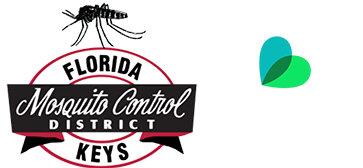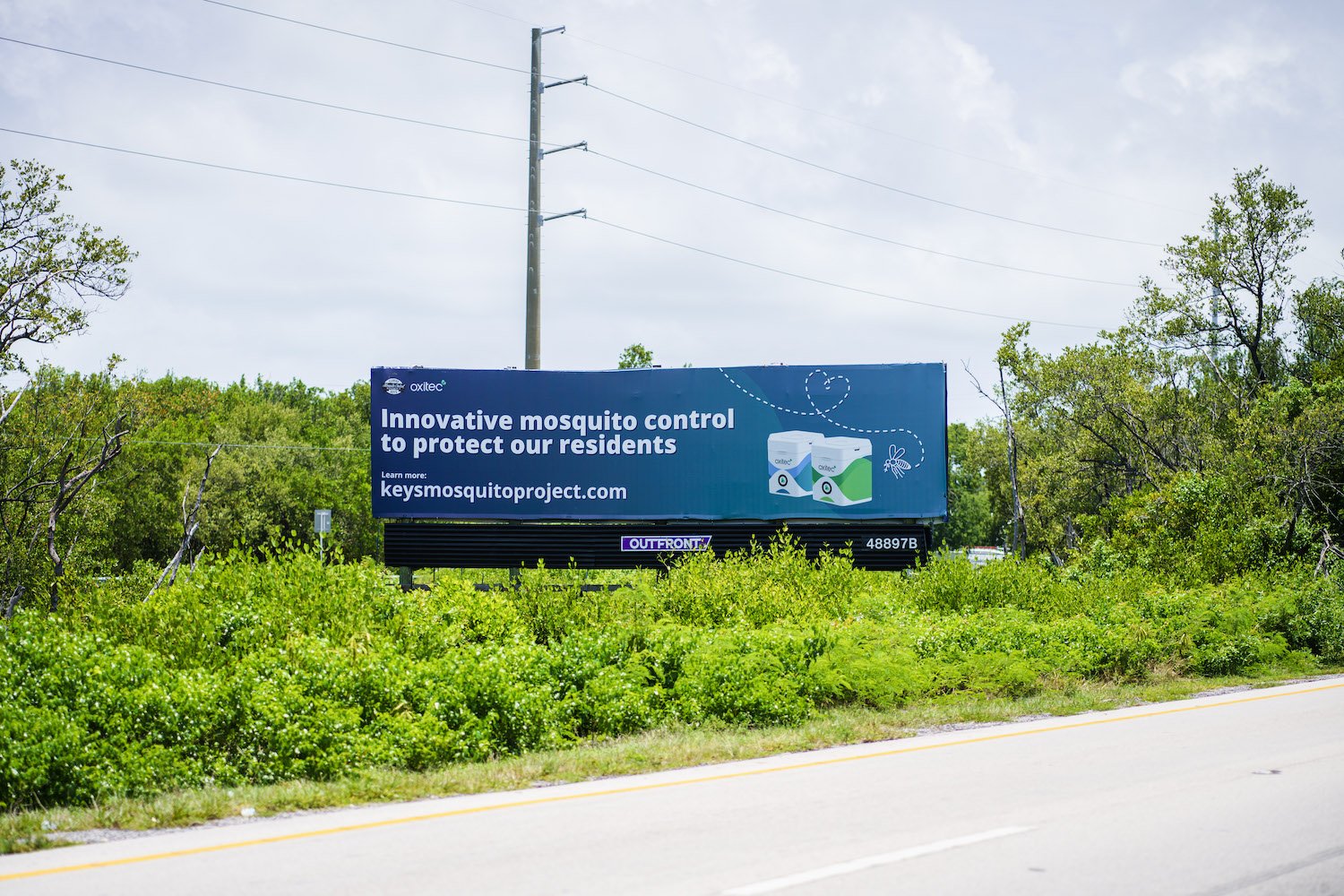Florida Keys Mosquito Control District (FKMCD) - Oxitec Mosquito Project
Quick Facts:
The FKMCD – Oxitec Mosquito Project is a partnership between FKMCD and Oxitec assessing the use of non-biting male Oxitec-developed mosquitoes as a method of effective local invasive Aedes aegypti mosquito control in the Florida Keys. Oxitec’s male mosquitoes emerge from just-add-water mosquito boxes that are situated on private properties, with the owners’ permission.
Three pilot seasons have concluded, and the Florida Keys Mosquito Control District (FKMCD) and Oxitec have together demonstrated that Oxitec non-biting, male Aedes aegypti mosquitoes perform well in the field, can reduce the local abundance of the invasive Aedes aegypti mosquito, and have enabled the optimization of just-add-water egg release devices. Oxitec is now working with the Environmental Protection Agency (EPA) to seek full commercial approval.
Oxitec’s non-biting male mosquitoes emerge from just-add-water boxes to find and mate with biting female Aedes aegypti mosquitoes.
Oxitec’s mosquitoes are precise, chemical-free and environmentally friendly.
This project is fully approved by the EPA and the State of Florida Department of Agriculture and Consumer Services (FDACS) and supported by an Independent Advisory Group.
Quick Links:
Project website – news, resources, information, events
Project images and Virtual Tour: Inside Oxitec Labs Worldwide (please contact us for available B-roll)
YouTube channel with recordings of previous Public Educational Webinars
List of 100+ scientific publications relating to Oxitec’s technology
The US EPA’s responses to public comments
The US EPA/US CDC memorandum on vectorial capacity of Oxitec’s technology
The State of Florida’s approval of the pilot project
About FKMCD:
The Florida Keys Mosquito Control District is a special taxing district authorized to control the presence of mosquitoes within Monroe County. By using necessary maintenance and improvements to help support the health, comfort, welfare, and prosperity of the people thereof, the FKMCD has been established for public health and other public purposes.
An important part of FKMCD’s mission is to protect residents in the Florida Keys from the local invasive disease-transmitting mosquito, Aedes aegypti. The FKMCD has monitored the presence of the local invasive Aedes aegypti closely and have seen a development of resistance to some of the current control methods. FKMCD partnered with Oxitec due to the need for new tools to combat this mosquito. Given the unique ecosystem in the Florida Keys, it is important that those tools are safe, environmentally friendly, and targeted. FKMCD is collaborating with Oxitec on this project, which has full approval from the US Environmental Protection Agency and the Florida Department of Agriculture and Consumer Services.
About Oxitec
Oxitec is an impact-driven company comprised of passionate people who share a mission to develop safe, effective solutions to enable communities to control disease-carrying and crop-destroying insects at scale. Oxitec’s insect technology has been deployed for 15 years around the world with strong support from governments, foundations, international organizations and communities alike. In the US, Oxitec has previously deployed agricultural insects with the approval of the US Department of Agriculture (USDA), demonstrating safety, efficacy and high levels of public acceptance. With more than 100 peer-reviewed scientific publications focused on its technology, and with high approval ratings from communities across countries and deployments, Oxitec’s technology is one of the most studied and tested insect-based technologies globally.
Oxitec is strongly committed to transparency, quality, and safety. Oxitec has made available on its website a large selection of the 100+ scientific studies and peer-reviewed articles relating to Oxitec’s technology and its performance, safety, deployment methods, genetics, and other features. In all its work worldwide, Oxitec operates in close partnerships with local governments and communities, prioritizing transparency, open communications and information-sharing with all stakeholders.
About the Aedes aegypti mosquito
Aedes aegypti is an invasive mosquito, not native to the United States, which carries and spreads harmful diseases such as dengue, Zika, yellow fever and chikungunya. In recent years the Florida Keys have experienced locally transmitted cases of dengue and travel-related cases of Zika. Local invasive Aedes aegypti mosquitoes make up approximately 4% of the mosquito population in the Keys but are responsible for virtually all the mosquito-borne human disease transmission.
The Aedes aegypti mosquito is an increasingly global threat, now living alongside half of the world’s population. There is still no cure or specific treatment for many diseases transmitted by Aedes aegypti, and public health agencies are trying to stop these devastating diseases at their common source: by controlling the Aedes aegypti mosquito itself.
Unfortunately, existing methods of controlling Aedes aegypti, such as spraying or fogging chemical insecticides, have struggled to prevent the spread of diseases. This is partly because Aedes aegypti has developed resistance to insecticides, rendering many commonly used chemicals less effective at controlling the mosquito.
About the FKMCD-Oxitec Mosquito Project
This ground-breaking project, conducted jointly by FKMCD and Oxitec, launched in April 2021 after a decade of planning, public engagement and regulatory approvals. The project continued in the 2022 mosquito season and is now entering its third season in spring 2023.
With consent, private property locations in the Florida Keys host Oxitec’s male Aedes aegypti boxes, that slowly release self-limiting, male mosquitoes. Like all male mosquitoes, Oxitec’s mosquitoes do not bite. Oxitec’s self-limiting gene allows the release of male-only adult mosquitoes into the environment which mate with local invasive Aedes aegypti females. The self-limiting gene prevents female offspring from surviving. With sustained releases of self-limiting male mosquitoes, the number of females is reduced, and the local invasive Aedes aegypti population declines.
Exact project locations within the Keys are determined by FKMCD and Oxitec with the support of local communities, taking into account the local invasive Aedes aegypti mosquito population. We also ensure appropriate locations to place the mosquito traps that will be used to monitor the effect of our male mosquito releases – an important aspect of the project. Community engagement in planned project areas is carried out in advance of releases, to find suitable locations for placement of mosquito release boxes and traps.
Throughout all release locations less than 5 million male mosquitoes are expected to be released during the 2023 mosquito season.
Oxitec’s just-add-water Aedes aegypti technology was successfully proven in the State of São Paulo, Brazil, where the technology suppressed Aedes aegypti by up to 96% in densely populated urban communities. In May 2020, Oxitec received full biosafety approval for this technology from Brazil’s national biosafety regulatory authority CTNBio after demonstrating the technology’s safety to human health and the environment.
Project Milestones:
2016: The US Food and Drug Administration (FDA) granted approval for a small-scale project with Oxitec’s first-generation mosquito, OX513A, in the Florida Keys
2017: FDA transferred jurisdiction for Oxitec mosquitoes to EPA
2019: Oxitec applied to EPA for an Experimental Use Permit (EUP) for its second-generation mosquito OX5034
2020: EPA granted an Experimental Use Permit (EUP) for pilot projects in Florida and Texas
2020: State of Florida authorities authorized the EUP for Oxitec releases in Monroe County, Florida
2020: The Florida Keys Mosquito Control District Board of Commissioners approved the project in the Florida Keys
2021: First releases of Oxitec mosquitoes in the Florida Keys to evaluate the effectiveness of this control tool for local invasive Aedes aegypti
2022: The project continued into a second season and showed promising results, demonstrating that Oxitec’s male mosquitoes can suitably disperse, they can find and mate local invasive Aedes aegypti females, and that their deployment can yield local invasive Aedes aegypti population reduction
2023: In 2023 the project completed its third successful season of releases.
2024: Following successful pilot deployments of Oxitec’s non-biting male mosquitoes, the FKMCD-Oxitec Mosquito Project examined potential integration with other mosquito control tools for the 2024 season.
Why this Project is Important:
Oxitec’s technology is designed to provide governments and communities with a powerful tool that can scale effectively, without the need for complex infrastructure, and serve as a stand-alone solution or ideally as a valuable component of area-wide, integrated vector management programs. To do so in the US, a commercial approval for the product from the EPA would be required. The data obtained under this Experimental Use Permit (EUP) will contribute to any subsequent registration package that Oxitec submits to the EPA for consideration.
Regulatory Agency Approvals:
EPA’s exhaustive review determined that there will be no unreasonable adverse effect to humans or the environment as a result of the permitted release of Oxitec’s male mosquitoes.
Oxitec is pleased that the EPA completed such a rigorous assessment of the data provided for the Oxitec mosquito, and that a finding has been made of no unreasonable adverse effect to humans or the environment. EPA considered extensive data relating to human health and potential impacts on the environment, non-target organisms and endangered species.
EPA also reviewed over 30,000 public comments in its determinations and responded in detail to all substantive comments made during the public consultation period for this application. Responses to comments are available in the EPA docket which can be found here.
Following EPA’s approval, the project was also approved by the Florida Department of Agriculture and Consumer Services, incorporating comments from other Florida agencies including the Florida Department of Environmental Protection (FDEP), the Florida Fish and Wildlife Conservation Commission (FWC), the Florida
Department of Health (DOH), the Bureau of Agricultural Environmental Laboratories (BAEL) and the Bureau of Scientific Evaluation and Technical Assistance, Scientific Evaluation Section (SES).
Key US EPA Findings Include:
No unreasonable adverse effects for humans or the environment due to introduction of background strain genetics into the local invasive Aedes aegypti population;
No unreasonable adverse effects for non-target organisms (bats, invertebrates, amphibians, etc.), either due to consumption of Oxitec male mosquitoes or due to decreases in the local invasive Aedes aegypti mosquito population;
EPA has made a “no effect” finding as to threatened or endangered species under the Endangered Species Act;
EPA concluded negligible risk of Oxitec mosquitoes spreading antibiotic-resistant bacteria in the US environment;
Careful Monitoring and Surveillance: EPA approved Oxitec’s robust monitoring program for the pilot, to track the mosquito releases and their impact. Releases include buffer zones, so they do not occur in the vicinity of potential environmental tetracycline sources, such as citrus orchards or sewage treatment plants. EPA acknowledges that these are extremely unlikely to be local invasive Aedes aegypti breeding sites.

